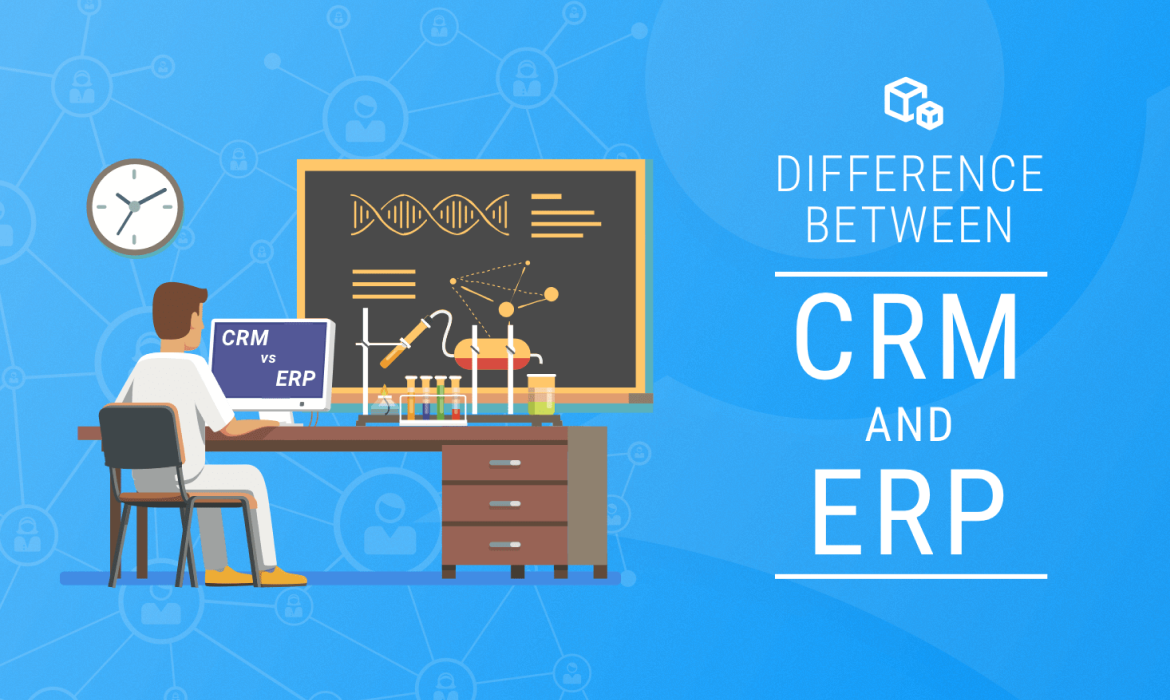Being a contemporary human means to puzzle out versatile abbreviations that overflew the lexicon. SMS was one of the pioneers in the advent of short combinations of letters instead of the accumulation of words. Gradually, new technologies set up exclusive titles consisting of abbreviations. In some cases, it may be rather confusing since one combination of letters may have several dissimilar definitions. E.g., SATA in computer science means Serial Advanced Technology Attachment while in molecular biology this acronym is referred to S-Acetylthioglycolic acid N-hydroxysuccinimide ester. Certainly, the context is the decisive factor in defining a proper meaning.
The context of the present article is about a commercial activity. So, people involved in versatile types of businesses will hardly face a trouble of misunderstanding certain abbreviations despite the fact that the profit-oriented world is overfilled with them. Today, the readers will learn not only the difference between CRM and ERP systems but also get to know the core of both notions.
1. CRM and ERP Definition
To shed the light on an issue “what is the difference between CRM and ERP?” it would be wise to define each term apart. So, a combination of the third, eighteenth, and thirteenth letters of the English alphabet is referred to customer relationship management. It involves versatile facets of organizing the interplay with clientage for enhancing satisfaction. These include the accumulation of data, examination of clients’ wishes, the shaping of versatile strategies in sales, marketing, and client support, as well as the efficiency analysis of implemented strategies.
Such well-known technologies as self-service, 24/7 customer support, and automated voice response phone application have the imprint of the said approach. Otherwise speaking, managing the interplay with clientage is a business philosophy according to which the comprehension of needs of an individual client is the way of winning success and prosperity in the future.
The principal difference between ERP and CRM lies not only in the alphabetic character set. Its acronym derives from enterprise resource planning. It does not focus on the client. It makes emphasis on the business with an aim to polish up the productivity of the entire profit-making operation. Put another way, the interrelation among versatile units and duties is shifted to an advanced level shaping an integral system.
Despite the said CRM and ERP difference, both systems have something in common namely the possibility to share routine intelligence throughout the organization in a fast and proficient way. Thus, all people involved in the organization activities shape an enterprise-wide environment with an online data sharing.
2. Where to Use Both Systems?
Since you already know what is ERP and CRM, it is obligatory to define their roles. In fact, both solutions are beneficial for almost any company. The world of commercial activities is based on the formula “product/service to the client”. If an entrepreneurship wants to prosper, it needs to satisfy its clientage. Therefore, a CRM system comes to the stage. The tool provides a 360-degrees approach to managing clients’ demands. In that case, even a small and subtle detail can be significant to achieve customer satisfaction.
ERP is a powerful managerial tool. Implantation of the said solution is a step to make operations throughout the company more effective and performant. The focus is made on data that is a core component of any key function including accounting, inventory, supply chain, etc. The tool allows revealing and fixing possible troubles in early stages. For example, a problem in the logistical chain will be detected by the ERP with the following share with all affected areas like the warehouse. All units obtain up-to-the-minute data along with a clear and accurate picture of the state of affairs at any moment.
3. Similarities Between SCM, CRM, and ERP
Being absorbed in explaining the definition of two mentioned systems, we have forgotten about another essential component of shifting the business to an electronic administration approach. Meet the supply chain management also known as SCM.
The supply chain is a set of elements that are directly or indirectly involved in procurement. Managing the chain denotes guidance of data flows within all stages to enhance total performance and cost-effectiveness of supply procedure.
Dissimilarities are understood due to the meaning of each system. Now, what are the similarities between SCM, CRM, and ERP? Each of them makes emphasis on a certain object whether it is the client, transaction, or procurement. Still, all these systems or tools deal with the data flow. Fundamentals of contemporary commercial activity rely upon information and utilization of data for versatile operations including those aimed at customer satisfaction, the supply of materials, and optimization of data sharing. The mentioned tools are the basis of e-business. Being integrated into the commercial activity, they provide access to the information in terms of time and space.
4. Key Differences Between CRM and ERP
Despite the fact that the core difference has already been mentioned above, it is not the single one. Practical dissimilarities observed upon the realization of the said solutions are given below.
- Tool for guiding customer relationships enables the tracking of every activity associated with clientage. ERP, in turn, is the tool to steer versatile transactions within a corporate structure;
- CRM can be a constituent part of ERP since the latter consolidates the data from versatile sources represented by functional groups of an enterprise via CRM, SCM, HRM, and others;
- ERP can boast of a longer period of existence compared to CRM;
- Another answer to the question “what is the difference between ERP and CRM?” comprises peculiarities of achieving results using both systems. Companies utilize CRM to conduct back-office transactions while ERP is deployed to accomplish them;
- If you need to manage interaction with clients, you should choose a CRM tool because ERM is beneficial for scheming the optimized utilization of resources;
- The final difference that discloses the core of both approaches deals with the monetary aspect. CRM is a tool to increase sales while ERP aims at the cost reduction.
5. Which System Is Better For You?
Perhaps, a torrent of facts has puzzled you a bit. Versatile abbreviations provide benefits. Still, you may doubt which system could be the best option for your commercial activity. It depends on what you do and what you need. CRM is the almighty tool since any profit-making transaction foresees the notion of the client. Does your enterprise distribute furniture or supply raw materials to various processing factories? In both cases, you will make a good thing of embedding the mentioned solution in your workflow.
Nevertheless, resource scheduling is deemed a better option since it can be deployed at any organization including the non-profit-making ones. Its basics lie in dealing with resources i.e. human, materials, time, finances etc. Besides, improving the interaction among departments of the corporate organization is unlikely to damage the overall performance.
6. Which System to Choose?
To answer this question, you have to realize your goals, the current state of affairs, and the difference between CRM and ERP. However, do not forget an old saying “never too much of a good thing”. It means that you can always do better even if it seems that the threshold of perfectionism is achieved. The best option is to implement all possible technological innovations to make your pipeline transparent, optimized, and performant. Any of the said technologies have numerous benefits.
Still, it is better to name one beyond others. An optimized operation means less stress experienced by the essential resource of any organization namely staff. Less stress results in an increased satisfaction of people working for you. Satisfaction in all of its aspects is beneficial. Regardless of the tool you choose, you will make a proper step towards the prosperity of your company.
7. Conclusion
Technological progress is a natural process of human evolution. In a global sense, it comprises such endeavors as finding a cure for terrible illnesses, discovering hidden opportunities of a human brain and bold attempts to colonize nearest planets. However, putting the mentioned tools into practice is also a part of such global development though manifested in a more prosaic way. Your company or commercial activity can join the global evolution by deploying SCM, CRM, HRM or another tool to optimize work.
Table of Contents
Crack the sales formula with CRM Lab
Twice a month, receive actionable CRM content to your inbox.

